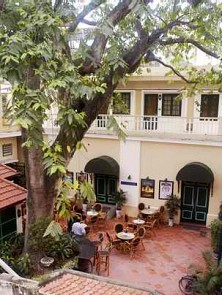HANOI – Sooner or later, expatriates in this city will find their way to the Cinematheque, a funky venue a few blocks from Hoan Kiem Lake that screens classic films and hosts social functions.
The yin and yang can be extreme. A couple of days after my 10-year-old daughter frolicked at a “Mama Mia” sing-along – dancing queen, young and sweet, only 17 – the Cinematheque screen featured the image of a gray-haired man recalling how, as an 18-year-old U.S. Marine Corps corporal, he led "search-and-destroy" missions and unwittingly engaged in chemical warfare.
Chuck Palazzo’s was one of several somber voices heard this night, some recorded in the film titled “Same Same But Different,” others from tourists who felt inspired to speak, sometimes with tears. These were not typical tourists. A party of 17 Americans – several veterans and anti-war activists, some who were both – were making a pilgrimage to various locales in a land that in many ways has defined their lives and, for many, haunted their psyches and families.
In Vietnam, warfare’s legacy was one of obvious destruction – the orphaned children, the economic ruin and even today the weapons, such as Agent Orange and unexploded bombs, that keep on taking lives. In America, warfare’s wreckage includes damaged souls.
Veterans who served in Vietnam have long comprised a disproportionate number of the homeless who suffer from mental illness and addiction. More recently, the latest lethal shooting spree at Fort Hood hints at rising levels of the depression, psychosis and suicidal tendencies of soldiers who served multiple tours of duty in Afghanistan and Iraq. Taking a warrior out a war does not always take the war within.
Such are the concerns of Chapter 160 of Veterans for Peace, the first overseas chapter of the American organization, which arranged this tour and the Cinematheque event. The members include a network of American expats here like Palazzo in Da Nang, Chuck Searcy in Hanoi, Dan Blackburn in Nha Trang and others who now labor to ameliorate the harsh legacy of Agent Orange and unexploded bombs.
Filmmaker Deryle Perryman cannot help but suspect if his child’s birth defects are linked to his own exposure to Agent Orange, like so many thousands of Vietnamese children. Perryman describes Vietnam as "the scene of the crime" and so many veterans, after some 30 or 40 years, “come over here to heal themselves.”
Their story, collectively, is one of all-American pride and innocence transformed into shame and guilt. They look back and realize how their patriotism was exploited, how they were misled into a war against the so-called 'great commie bogeyman’ that, it was said, would cause U.S. allies to fall like so many dominoes, threatening America itself. And yet it evolved into something more like a war crime – something many Americans and surely the U.S. government would never acknowledge.
Guilt can sneak up on you. Born a few years too late to worry about being drafted or joining in protests, I watched the war on TV and liked how the front page of my local newspaper featured a graphic depiction of the “body count.” To me it was a scoreboard of war that seemed to show not only that Americans were winning, but it was not even close. Had anyone told me that the numbers included the women, children and elderly killed, my young self would have called them a liar. We were the good guys. We did not do things like that.
So news of the 500 villagers slaughtered in My Lai came as a shock – but it was surely a tragic aberration, right? It was all Lt. Calley’s fault, right?
Living here has broadened my understanding. On another night at Cinematheque I saw “The Little Girl of Hanoi,” a moving Vietnamese film inspired by the “Christmas bombings” of 1972, and at another event I purchased the book “Kill Anything That Moves” by journalist and historian Nick Turse. Based on long-neglected records of war crime investigations and buttressed by Turse’s research in Vietnam, the book details the extremes of the U.S. military’s strategy of a war of attrition. My Lai, as Turse puts it, was “an operation, not an aberration.” Whether deliberate or accidental, the killing of noncombatants would be used to swell the body counts.
The other night, the veterans lamented how the lessons of the war here had been lost in America. Their comments left me thinking that many in this group, like probably most Americans today, thought the invasion of Afghanistan was justified to target the al Quaeda terrorists and their Taliban allies, but the invasion of Iraq was morally wrong and, like Vietnam, based on dubious, fabricated “intel.” Among those who spoke was Ann Wright, who is a retired Army colonel and former diplomat who helped establish the new U.S. embassy in Kabul, Afghanistan. She was one of three U.S. officials to resign their posts in protest over the invasion of Iraq.
The lessons not learned are all rather depressing. It leaves me thinking I need another reason to visit Cinematheque. I hear that “The Wizard of Oz” might play around Easter. It might be nice to take the kids and sing “Somewhere Over the Rainbow.”
Like us on Facebook or follow us on Twitter to get the latest news about Vietnam!

























































